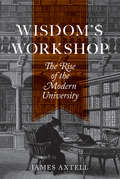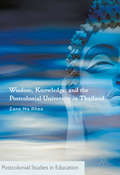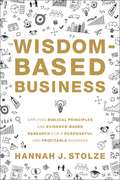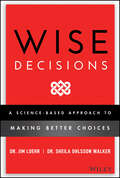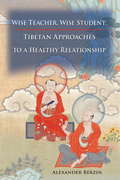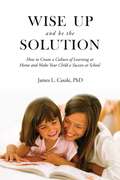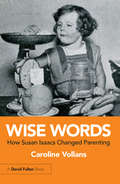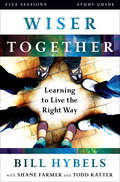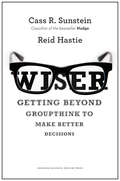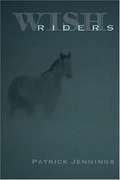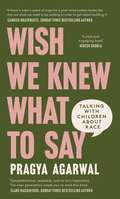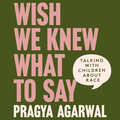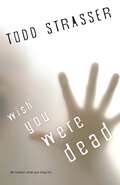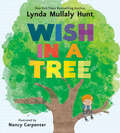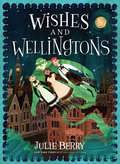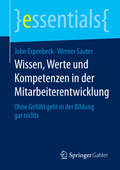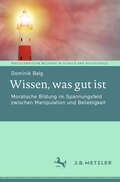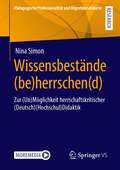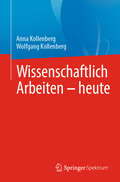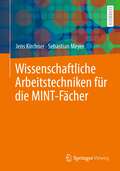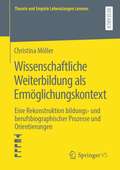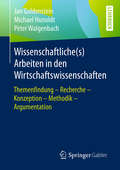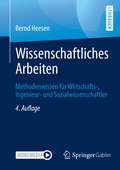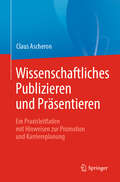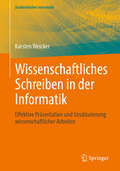- Table View
- List View
Wisdom's Workshop
by James AxtellWhen universities began in the Middle Ages, Pope Gregory IX described them as "wisdom's special workshop." He could not have foreseen how far these institutions would travel and develop. Tracing the eight-hundred-year evolution of the elite research university from its roots in medieval Europe to its remarkable incarnation today, Wisdom's Workshop places this durable institution in sweeping historical perspective. In particular, James Axtell focuses on the ways that the best American universities took on Continental influences, developing into the finest expressions of the modern university and enviable models for kindred institutions worldwide. Despite hand-wringing reports to the contrary, the venerable university continues to renew itself, becoming ever more indispensable to society in the United States and beyond.Born in Europe, the university did not mature in America until the late nineteenth century. Once its heirs proliferated from coast to coast, their national role expanded greatly during World War II and the Cold War. Axtell links the legacies of European universities and Tudor-Stuart Oxbridge to nine colonial and hundreds of pre-Civil War colleges, and delves into how U.S. universities were shaped by Americans who studied in German universities and adapted their discoveries to domestic conditions and goals. The graduate school, the PhD, and the research imperative became and remain the hallmarks of the American university system and higher education institutions around the globe.A rich exploration of the historical lineage of today's research universities, Wisdom's Workshop explains the reasons for their ascendancy in America and their continued international preeminence.
Wisdom, Knowledge, and the Postcolonial University in Thailand (Postcolonial Studies in Education)
by Zane Ma RheaThis book examines Thai knowledge and wisdom from the perspective of postmodern, postcolonial globalization. Ma Rhea explores the ways in which the Thai university system attempts to balance old knowledge traditions, Buddhist and rural, with new Thai and imported knowledge. It traces the development of Thai university partnerships with outsiders, focusing on the seventy year relationship between Thailand and Australia. In comparison, it analyses the old Thai Buddhist wisdom tradition and in the final chapters proposes its worthiness as a pedagogical pathway for universities globally.
Wisdom-Based Business: Applying Biblical Principles and Evidence-Based Research for a Purposeful and Profitable Business
by Hannah J. StolzeMake Your Business Purposeful and ProfitableAt its best, business is both purposeful and profitable, dynamic and gainful, commercial and rewarding. Far from being opposites, good business and good behavior go hand-in-hand, and biblical principles can align with best practices. In Wisdom-Based Business, marketing and supply-chain professor Hannah J. Stolze draws principles from the Bible's wisdom literature and from evidence-based research to create a framework for business that is oriented toward excellence and sustainability. This book addresses import issues such as:The virtue of profitServant leadershipWisdom-based values, such as long-term over short-term, stakeholders, and qualityBeneficial outcomes of wisdom-based business, including reputation and comparative advantageThe ultimate outcome of eternal impactIntended for business students and working professionals alike, Wisdom-Based Business demonstrates how to pursue profitability to the honor and glory of God. Unique among Christian books on business, it helps readers make the right decisions in business by presenting:Biblical Principles. Drawing upon the Bible's wisdom literature, each topic addressed is undergirded by insights from Scripture.Evidence-Based Research. Recommendations are thoroughly grounded in the best and latest research in the field.Case Studies: Each chapter demonstrates how the principles can be lived out in the real world, amid the inevitable challenges and competition all business confronts. Any Christian who works in the marketplace or is training to work in the marketplace will benefit from Wisdom-Based Business' practical guidance on how to reflect Christian values in their corporate tasks and strategies--and on how those values can be not hindrances but keys to success.
Wise Decisions: A Science-Based Approach to Making Better Choices
by James E. Loehr Sheila Ohlsson WalkerA concrete and hands-on method for improving your everyday decisions Every 15 minutes, each of us can make ten or more small decisions. Some of them are relatively inconsequential, while others can change the course of our lives. What if you could improve all of your decisions, across the board, and start to build a healthier, more productive, and meaningful life? In Wise Decisions: A Science-Based Approach to Making Better Choices, a team of accomplished industry experts delivers an evidence- and research-based blueprint for making the best decisions you can with the information you have. You’ll learn to make the targeted, repeated investment of energy required to turn your decision-making process into one informed by reason, emotion, intuition, and science. In the book, you’ll discover: How to put the decision-making process under a microscope and learn what makes a decision truly wise Ways to help children, teens, and families make wise decisions How to train yourself to make wise decisions with voice training and other strategiesA can’t-miss resource for parents, teachers, coaches, managers, executives, and other business leaders, Wise Decisions also offers timeless advice and guidance for anyone else hoping to improve the decision-making abilities of the people close to them.
Wise Teacher, Wise Student
by Alexander BerzinThe relationship with a spiritual teacher can be the most rewarding and life-enhancing experience in one's life. However, it also may be fraught with problems. Student reactions to their spiritual teachers may range from extreme deification to deep mistrust, and these responses prevent the benefits of a healthy relationship. This book explores the sources of these misunderstandings and re-examines traditional Tibetan Buddhist teachings revealing methods to heal wounds and develop healthy relationships that can be applied to benefit students in any spiritual tradition.
Wise Up and Be the Solution: How to Create a Culture of Learning at Home and Make Your Child a Success in School
by James CasaleAs parents, we simply want what’s best for our children, but sometimes the modern education system does not always cater to the individual needs of every child. Each child is unique and requires different amounts of attention and support. As your child’s first teacher, you are the most influential factor on his or her growth--academically, emotionally, and psychologically. In Wise Up and Be the Solution, James Casale shows you how to be more proactive and have more control over your son or daughter’s education. With 50 years of teaching experience, Casale gives you the tools to change your family dynamic for the better. This book is straightforward, jargon-free, and easy to follow. Parents will learn how to gain their children’s attention and how to limit the things that can distract them. Casale also discusses parent-teacher conferences from an educator’s perspective, allowing parents to better understand teachers and be more prepared during these meetings. This book is a must have guide for parents who are eager to see their children succeed in school and life. It provides all the necessary tools to creating a culture of learning right in your home.
Wise Words: How Susan Isaacs Changed Parenting
by Caroline Vollans"Harassed" writes: "Your answers to correspondents are exceedingly clear, and when I read them I say, ‘That is just the answer I should think of’, though I believe I should have great difficulty when it came actually to putting it into words! However, I cannot answer my own problems, so will you please help me?" (20 August 1930) This much-needed collection brings together the columns of parenting adviser Ursula Wise, "agony aunt" for The Nursery World between 1929 and 1936, and pseudonym for the eminent educationalist and pioneering psychoanalyst Susan Isaacs. Wise’s replies, informed by theories in education, psychology and psychoanalysis, provide an insight into the development of modern, child-centred attitudes to parenting, with remarkably fresh and relevant advice. The letters are passionate, urgent, occasionally provocative, sometimes funny and always thoughtful. Topics from behaviour and temperament, anxieties and phobias, to play and education are explored and each theme is introduced and contextualised in contemporary parenting approaches. Bringing pivotal theories from the fields of education, child psychology and psychoanalysis into dialogue, this is an essential read for early years practitioners, teachers, course leaders and those studying in the field of early years education and child psychoanalysis. The continued relevance of Isaacs’ advice for modern parenting also makes this an enjoyable and informative read for parents. It is also an excellent resource for those interested in social history and the little known contributions made by women pioneers.
Wiser Together Study Guide: Learning to Live the Right Way
by Bill Hybels Shane Farmer Todd KatterIn this five-session video-based Bible study, best-selling author and pastor Bill Hybels challenges you to make doing life together a priority, exploring from the book of Proverbs how experiencing community and growing in wisdom are inseparably linked and offering practical direction on how to experience this with others. All of us want to get better at life. Gettting wiser alone, however, is not the way it works. God didn’t wire us to catch onto wise and godly living through lone-ranger attempts at learning; it’s something that rubs off on us when we spend time with others who have the wisdom of God living inside of them. As the proverb says, “Iron sharpens iron as one person sharpens another.” This study is designed with both new and experienced group leaders in mind. For new leaders, it includes optional weekly DVD training sessions to help them lead a fantastic, first-time small group experience. For experienced leaders, it includes a "Going Deeper" section for those ready to take this content to the next level.
Wiser: Getting Beyond Groupthink to Make Groups Smarter
by Cass R. Sunstein Reid HastieWhy are group decisions so hard? Since the beginning of human history, people have made decisions in groups-first in families and villages, and now as part of companies, governments, school boards, religious organizations, or any one of countless other groups. And having more than one person to help decide is good because the group benefits from the collective knowledge of all of its members, and this results in better decisions. Right? Back to reality. We’ve all been involved in group decisions-and they’re hard. And they often turn out badly. Why? Many blame bad decisions on "groupthink” without a clear idea of what that term really means. Now, Nudge coauthor Cass Sunstein and leading decision-making scholar Reid Hastie shed light on the specifics of why and how group decisions go wrong-and offer tactics and lessons to help leaders avoid the pitfalls and reach better outcomes. In the first part of the book, they explain in clear and fascinating detail the distinct problems groups run into: They often amplify, rather than correct, individual errors in judgment They fall victim to cascade effects, as members follow what others say or do They become polarized, adopting more extreme positions than the ones they began with They emphasize what everybody knows instead of focusing on critical information that only a few people know In the second part of the book, the authors turn to straightforward methods and advice for making groups smarter. These approaches include silencing the leader so that the views of other group members can surface, rethinking rewards and incentives to encourage people to reveal their own knowledge, thoughtfully assigning roles that are aligned with people’s unique strengths, and more. With examples from a broad range of organizations-from Google to the CIA-and written in an engaging and witty style, Wiser will not only enlighten you; it will help your team and your organization make better decisions-decisions that lead to greater success.
Wish Riders
by Patrick JenningsFifteen-year-old Dusty, a ward of the state, is forced to work in a logging camp during the Depression. Despite the bleakness of her life, spirited Dusty dreams of escape. One day, a mysterious seagull delivers some unusual seeds to Dusty. Her whole life changes when she plants them. Perhaps it is the strength of her wishes, or the magic of the forest, but some unknown power transforms the tiny seeds into an astonishing creatureâ "and a possible means of deliverance. Now Dusty and her friends have a way to navigate the enchanted, though dangerous, forest, and escape the wretched existence they've been trapped in all their lives. Richly layered with fairy-tale lore and steeped in both the familiar and the darker elements of the Cinderella story, Patrick Jennings's inspired novel weaves a compelling tale about finding freedom, and finding oneself.
Wish We Knew What to Say: Talking with Children About Race
by Dr Pragya Agarwal'A thoughtful, prescient read for any mother or father parenting through the unique challenges of this racially polarised year, decade and beyond' Kenya Hunt 'Comprehensive, readable, and so very important. The next generation needs you to read this book' Clare Mackintosh, Sunday Times bestselling author'A vital book that equips us to have conversations about race and racism with young people, ensuring we are all playing our part to raise the next generations as anti-racist. With excellent, clear advice from Dr Agarwal I Wish We Knew What to Say is a quick, engaging and easily digestible read' Nikesh ShuklaWe want our children to thrive and flourish in a diverse, multi-cultural world and we owe it to them to help them make sense of the confusing and emotionally charged messages they receive about themselves and others. These early years are the most crucial when children are curious about the world around them, but are also quick to form stereotypes and biases that can become deeply ingrained as they grow older. These are the people who are going to inherit this world, and we owe it to them to lay a strong foundation for the next phases of their lives. Wish We Knew What to Say is a timely and urgent book that gives scenarios, questions, thought starters, resources and advice in an accessible manner on how to tackle tricky conversations around race and racism with confidence and awareness. it brings in the science of how children perceive race and form racial identity, combining it with personal stories and experiences to create a handy guide that every parent would refer to again and again. Written by behavioural and data scientist, Dr Pragya Agarwal, Wish We Knew What to Say will help all parents, carers and educators give children the tools and vocabulary to talk about people's differences and similarities in an open, non-judgemental, curious way, and help them address any unfairness they might see or encounter.
Wish We Knew What to Say: Talking with Children About Race
by Dr Pragya Agarwal'A thoughtful, prescient read for any mother or father parenting through the unique challenges of this racially polarised year, decade and beyond' Kenya Hunt 'Comprehensive, readable, and so very important. The next generation needs you to read this book' Clare Mackintosh, Sunday Times bestselling author'A vital book that equips us to have conversations about race and racism with young people, ensuring we are all playing our part to raise the next generations as anti-racist. With excellent, clear advice from Dr Agarwal I Wish We Knew What to Say is a quick, engaging and easily digestible read' Nikesh ShuklaWe want our children to thrive and flourish in a diverse, multi-cultural world and we owe it to them to help them make sense of the confusing and emotionally charged messages they receive about themselves and others. These early years are the most crucial when children are curious about the world around them, but are also quick to form stereotypes and biases that can become deeply ingrained as they grow older. These are the people who are going to inherit this world, and we owe it to them to lay a strong foundation for the next phases of their lives. Wish We Knew What to Say is a timely and urgent book that gives scenarios, questions, thought starters, resources and advice in an accessible manner on how to tackle tricky conversations around race and racism with confidence and awareness. it brings in the science of how children perceive race and form racial identity, combining it with personal stories and experiences to create a handy guide that every parent would refer to again and again. Written by behavioural and data scientist, Dr Pragya Agarwal, Wish We Knew What to Say will help all parents, carers and educators give children the tools and vocabulary to talk about people's differences and similarities in an open, non-judgemental, curious way, and help them address any unfairness they might see or encounter.
Wish You Were Dead
by Todd StrasserI'll begin with Lucy. She is definitely first on the list. You can't believe how it feels to be in the cafeteria and turn around and there she is staring at me like I'm some disgusting bug or vermin. Does she really think I WANT to be this way? I hate you, Lucy. I really hate you. You are my #1 pick. I wish you were dead. The day after anonymous blogger Str-S-d wishes the popular girl would die, Lucy vanishes. The students of Soundview High are scared and worried. Especially frightened and wracked with guilt is Madison Archer, Lucy's friend and the last person to see her the night she disappeared. As days pass with no sign of the missing girl, even the attention of Tyler, an attractive new student, is not enough to distract Madison from her growing sense of foreboding. When two more popular students disappear after their names are mentioned on Str-S-d's blog, the residents of Soundview panic. Meanwhile, Madison receives anonymous notes warning that she could be next. Desperate to solve the mystery before anyone else disappears, Madison turns to Tyler, but can she trust him when it becomes clear that he knows more than he's sharing? The clock is ticking. Madison must uncover the truth behind the mysterious disappearances . . . before her name appears in Str-S-d's blog. In the spirit of stories like I Know What You Did Last Summer, Todd Strasser updates the teen thriller for the techno age with Wish You Were Dead.
Wish in a Tree
by Lynda Mullaly HuntAn uplifting picture book celebrating neurodiversity, starring characters from Lynda Mullaly Hunt's New York Times bestselling novel Fish in a TreeOliver&’s brain is a volcano of ideas—always bubbling with questions. This makes it hard to focus at school, and sometimes he worries he won&’t ever fit in there. So it&’s a good thing he has a friend who reminds him that great minds don&’t think alike. And that a brain that blazes with curiosity and imagination is a glorious thing. Featuring artwork showcasing all the wonderful things going on in Oliver&’s astonishing brain, this uplifting book celebrates out-of-the-box thinking, the power of creativity, and the importance of being proud of the things that set us apart.
Wishes and Wellingtons (Wishes and Wellingtons #1)
by Julie BerryFrom New York Times bestselling and award-winning author Julie Berry comes a brand new middle-grade fantasy adventure full of friendship, magic, and mischief.Be careful what you wish for ...Maeve Merritt chafes at the rigid rules at her London boarding school for "Upright Young Ladies." When punishment forces her to sort through the trash, she finds a sardine tin that houses a foul-tempered djinni with no intention of submitting to a schoolgirl as his master.Soon an orphan boy from the charitable home next door, a mysterious tall man in ginger whiskers, a disgruntled school worker, and a take-no-prisoners business tycoon are in hot pursuit of Maeve and her magical discovery. It'll take all of her quick thinking and sass to set matters right. Maeve Merritt is one feisty heroine you won't soon forget.First published as an Audible Original in 2018The perfect book for:Ages 8-11Young fantasy readersEmpowering young girls
Wissen, Werte und Kompetenzen in der Mitarbeiterentwicklung: Ohne Gefühl geht in der Bildung gar nichts (essentials)
by John Erpenbeck Werner SauterJohn Erpenbeck und Werner Sauter erklären, warum Wissen und Qualifikation keine Kompetenzen sind. Diese Kriterien stellen vielmehr die Fähigkeit dar, Problemstellungen in der Praxis selbstorganisiert zu lösen und auf dieser Basis effektiv zu handeln. Die Autoren beschreiben einen praxiserprobten Kreislauf des Lernens, der die Verinnerlichung (Interiorisation) von Werten und damit Kompetenzentwicklung im Rahmen von Praxisprojekten und im Prozess der Arbeit sowie im Internet ermöglicht. Die Gestaltung dieses Lernrahmens orientiert sich dabei konsequent an den Entwicklungen im Web 2. 0 und in der Arbeitswelt.
Wissen, was gut ist: Moralische Bildung im Spannungsfeld zwischen Manipulation und Beliebigkeit (Philosophische Bildung in Schule und Hochschule)
by Dominik BalgWas sind die Ziele moralischer Bildung? Angesichts aktueller moralischer Herausforderungen, so ein naheliegender Gedanke, müssen wir zukünftigen Generationen gezielt vermitteln, dass einige Rede- und Verhaltensweisen schlichtweg moralisch problematisch sind, und dass es spezifische moralische Prinzipien gibt, die es zu berücksichtigen gilt. Gleichzeitig provoziert eine solche Überlegung unmittelbar die Sorge, dass es sich bei der Vermittlung spezifischer moralischer Ansichten um eine Form illegitimer Bevormundung handeln würde – sollte es bei moralischer Bildung nicht vielmehr um die Befähigung zur eigenständigen Reflexion moralischer Problemzusammenhänge gehen? Vor dem Hintergrund dieser Spannung zwischen dem Wunsch, klar für konkrete Werte einzustehen und der Sorge, Heranwachsende in ihrem Recht auf eine individuelle Urteilsbildung einzuschränken, möchte ich die Idee diskutieren, dass es bei moralischer Bildung um die gezielte Vermittlung moralischen Wissens gehen sollte – also Wissen darüber, was moralisch richtig und was moralisch falsch ist. Obwohl es sich hierbei um eine durchaus kontroverse Idee handelt, verdient Sie vor dem Hintergrund aktueller moralischer Herausforderungen meiner Meinung nach dringend einer genaueren Betrachtung.
Wissensbestände: Zur (Un)Möglichkeit herrschaftskritischer (Deutsch)(Hochschul)Didaktik (Pädagogische Professionalität und Migrationsdiskurse)
by Nina SimonIm Rahmen eines Plädoyers für eine epistemologische Neuorientierung der Deutschdidaktik versucht dieses Buch (Deutsch)(Hochschul)Didaktik herrschafts- und rassismuskritisch zu reflektieren und weiterzuentwickeln. Entlang einer Auseinandersetzung mit zahlreichen Interviewäußerungen von Studierenden und theoretischen Perspektiven auf die Universität, gesellschaftliche (Herrschafts-)Verhältnisse, das Pädagogische, didaktische Gegenstände und Lehrende wird eine herrschafts- und rassismuskritisch inspirierte (Deutsch)(Hochschul)Didaktik begründet, die beständig zweierlei ist: möglich und unmöglich.
Wissenschaftlich Arbeiten - heute
by Anna Kollenberg Wolfgang KollenbergDie Stellung von Wissenschaft in der Gesellschaft hat sich im Laufe der Zeit immer wieder verändert. Heute ist der Zugang zu einer wissenschaftlichen Ausbildung leichter als je zuvor. Die Zahl der Hochschulen und der Studiengänge hat enorm zugenommen. Forschung findet heute nicht nur an staatlichen Hochschulen, sondern zu einem erheblichen Teil in der Industrie und privaten Institutionen statt. Was bedeuten diese Veränderungen für das Wissenschaftliche Arbeiten? Anna und Wolfgang Kollenberg geben einen detaillierten Einblick in das Panorama wissenschaftlicher Methoden, wobei gelegentlich auch Einblicke in die Theorie und Geschichte der Wissenschaft geboten werden. Dadurch ist dieses Buch nicht nur ein reicher Fundus für angehende Wissenschaftler und Forschende, sondern auch für wissenschaftsinteressierte Laien überaus lesenswert.
Wissenschaftliche Arbeitstechniken für die MINT-Fächer
by Jens Kirchner Sebastian MeyerDas Buch vermittelt die grundlegenden Arbeitstechniken, die für Seminare und Abschlussarbeiten wie auch für die Erstellung wissenschaftlicher Publikationen im Bereich Mathematik, Informatik, der Ingenieur- und Naturwissenschaften (MINT-Fächer) nötig sind. Es deckt den gesamten Ablauf eines solchen wissenschaftlichen Projekts ab: angefangen von der Themendefinition und Projektplanung über die Grundlagen des wissenschaftlichen Arbeitens und Recherchierens bis zur Organisation und Aufbereitung von Informationen, strukturiertem Schreiben sowie Erstellen und Halten von Präsentationen.
Wissenschaftliche Weiterbildung als Ermöglichungskontext: Eine Rekonstruktion bildungs- und berufsbiographischer Prozesse und Orientierungen (Theorie und Empirie Lebenslangen Lernens)
by Christina MöllerUniversitäre wissenschaftliche Weiterbildung kann in verschiedenen Lebensphasen zum bedeutsamen bildungs- und berufsbiographischen Ermöglichungskontext werden. Vor dem Hintergrund gesellschaftlicher Entwicklungen wie dem demografischen Wandel, Fachkräftemangel und der Entwicklung zur Wissensgesellschaft ermöglicht wissenschaftliche Weiterbildung nicht nur Wissensaneignung, sondern kann auch identitäre Suchprozesse begleiten und berufliche Veränderungen ermöglichen. Dem geht die Autorin mittels biographischer Erzählzeugnisse von Studienabsolvent*innen eines theologischen Weiterbildungsmasters nach.
Wissenschaftliche(s) Arbeiten in den Wirtschaftswissenschaften: Themenfindung - Recherche - Konzeption - Methodik - Argumentation
by Peter Walgenbach Jan Goldenstein Michael HunoldtDieses Buch unterstützt bei der erfolgreichen Anfertigung wissenschaftlicher Arbeiten, insbesondere von Abschlussarbeiten. Es geht ausführlich auf alle relevanten Teilaspekte von der Ideengenerierung über die Literaturrecherche bis zum Verfassen der finalen Arbeit ein. Es erläutert anwendungsorientiert die vier Grundtypen wissenschaftlicher Arbeiten: Literaturübersichten, theoretisch-konzeptionelle Arbeiten sowie qualitative und quantitative Studien. Anhand konkreter Beispiele stellen die Autoren wesentliche Charakteristika und Kernelemente der jeweiligen Grundtypen dar und vermitteln deren strukturierte Umsetzung. Die Fokussierung auf die Managementwissenschaften in der BWL ermöglicht eine detailreiche Darstellung, von der Bachelor- und Masterstudierende ebenso profitieren können wie Doktorand/inn/en.
Wissenschaftliches Arbeiten: Methodenwissen für Wirtschafts-, Ingenieur- und Sozialwissenschaftler
by Bernd HeesenSchnell und kompakt vermittelt dieses Buch die wichtigsten Methoden und Techniken des modernen wissenschaftlichen Arbeitens und führt gezielt in die Erstellung von Bachelor-, Master- und Dissertationsarbeiten für Wirtschafts-, Ingenieur- und Sozialwissenschaftler ein. Studierende profitieren besonders von dem praxiserprobten Aufbau des Buches und dem Bezug auf einen international etablierten wissenschaftlichen Standard, den APA-Standard. Quellenangaben erfolgen hier entsprechend der oft auch als Harvard-Zitation bekannten Teilbelegmethode.Eine Vorlage zur Anfertigung wissenschaftlicher Arbeiten mit Microsoft Word finden Sie auf der Webseite zum Buch. Diese erleichtert das effektive Schreiben.Die vierte Auflage wurde umfassend aktualisiert.
Wissenschaftliches Publizieren und Präsentieren: Ein Praxisleitfaden mit Hinweisen zur Promotion und Karriereplanung
by Claus AscheronDas Ziel dieses Buches ist es, jungen Wissenschaftlern zu helfen, ihre mündliche und schriftliche Kommunikationsfähigkeit zu verbessern und damit die eigenen Ergebnisse besser zu verkaufen. Dieses Buch ist kein wissenschaftliches Lehrbuch. Es stellt die oft vergessene Frage danach, wie man seine wissenschaftlichen Ergebnisse effektiv und überzeugend in Vorträgen und Publikationen darstellt. Zusätzlich gibt dieses Buch Hintergrundwissen zum Prozess des wissenschaftlichen Publizierens und zu den wissenschaftlichen Gepflogenheiten.Die Empfehlungen helfen dabei, einen guten und effektiven Arbeits- und Kommunikationsstil zu entwickeln, der einem ein Leben lang nützt und Befriedigung in der Arbeit bringt.Weiterhin werden konkrete Hinweise dazu gegeben, wie eine Dissertation zu verfassen und erfolgreich zu verteidigen ist und wie die ersten Schritte der Karriereplanung gelingen.
Wissenschaftliches Schreiben in der Informatik: Effektive Präsentation und Strukturierung wissenschaftlicher Arbeiten (Studienbücher Informatik)
by Karsten WeickerDie besten wissenschaftlichen Ergebnisse und Erkenntnisse kommen nicht zur Geltung, wenn sie die Adressaten nicht erreichen oder missverstanden werden. Dieses kompaktes Buch führt für wissenschaftliche Schriftwerke der Informatik in die Besonderheiten der Fachsprache ein und liefert Tipps und Tricks, wie die eigene Arbeit aufbereitet werden kann.Schwerpunkte liegen dabei auf der Frage, wie man eine Arbeit strukturiert und gliedert, den Umgang mit Quellen und konkrete Hinweise zum Schreibstil. Das Buch thematisiert alle Präsentationsformen wissenschaftlicher Erkenntnisse - als Schriftstück vom Paper oder der Projektausarbeitung bis zur Bachelor- und Masterarbeit, aber auch als Vortrag oder Posterpräsentation. Da die gegenseitige Begutachtung ein essentieller Teil der wissenschaftlichen Qualitätssicherung ist, wird auch der Prozess der Peer-Bewertung gesondert behandelt.
